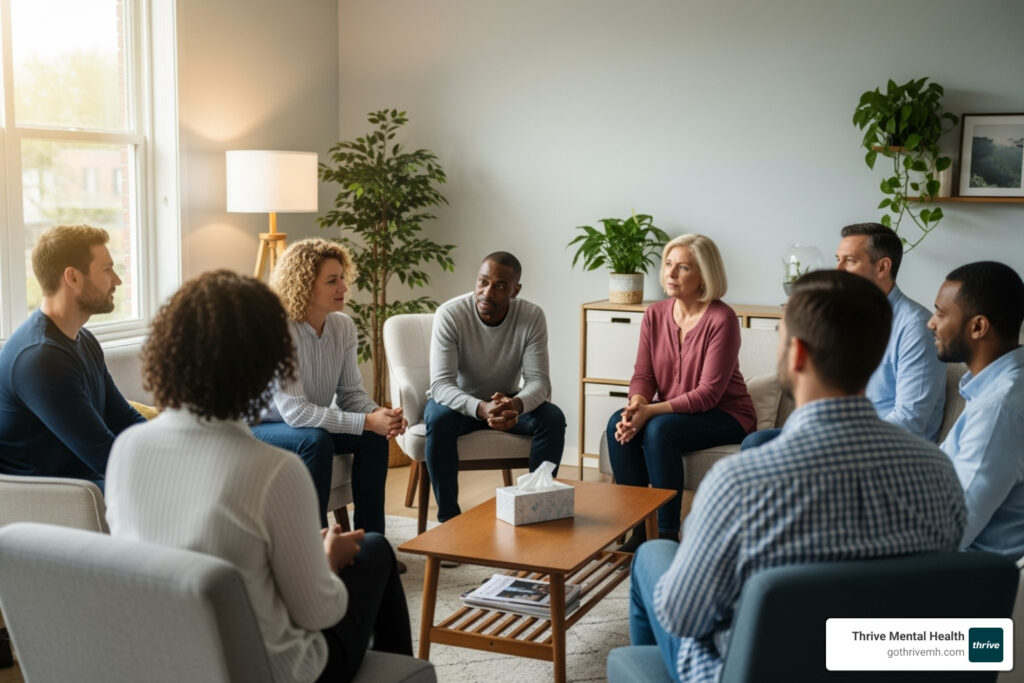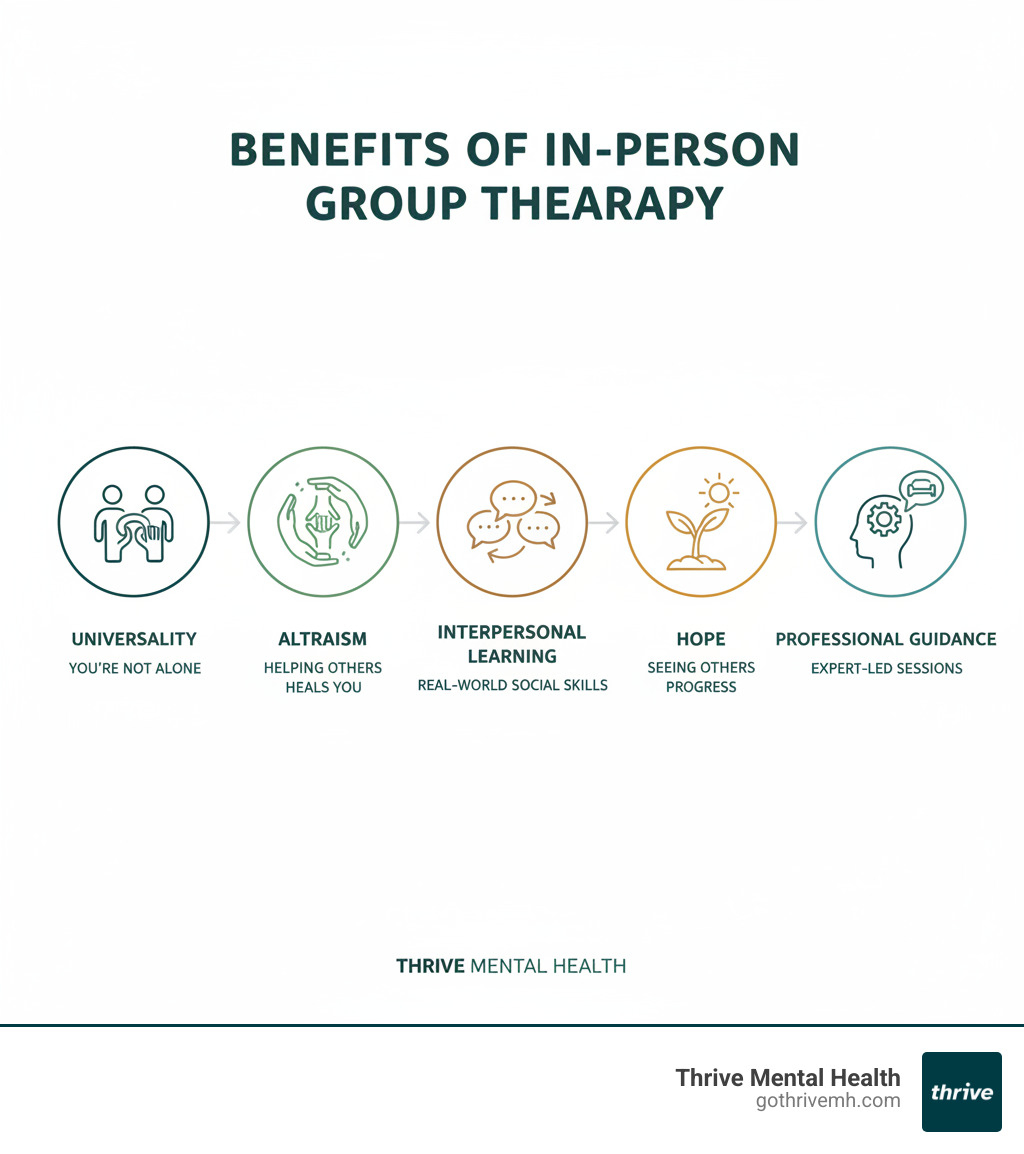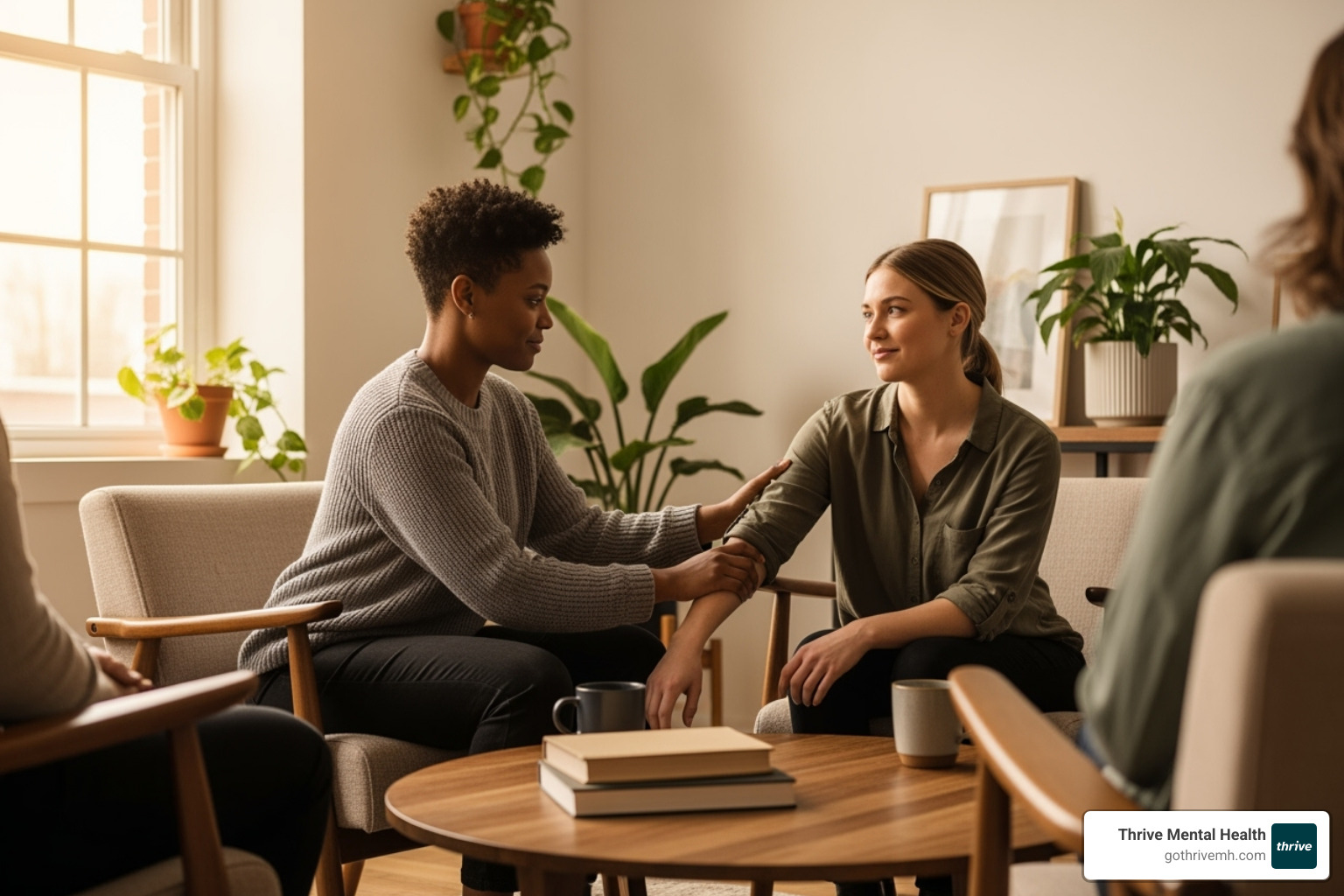Why In-Person Group Therapy Might Be Your Perfect Fit

In Person Group Therapy: Your Perfect Fit 2025
The Power of Healing Together
In person group therapy is a form of psychotherapy where 5-15 people with similar challenges meet face-to-face with licensed therapists to work through their struggles together. Unlike casual support groups, it’s a structured therapeutic process combining professional guidance with peer support in a confidential setting.
Quick comparison of in-person vs. online group therapy:
| Factor | In-Person | Online |
|---|---|---|
| Non-verbal cues | Full body language visible | Limited to facial expressions |
| Connection depth | Stronger physical presence | Good but less immersive |
| Accessibility | Requires travel to location | Available from anywhere |
| Spontaneous interaction | Natural, immediate | Can feel delayed or awkward |
| Environment control | Shared therapeutic space | Individual home distractions |
Research shows group therapy can be as effective as individual therapy, with the added benefit of peer support. The shared physical space creates deeper trust through non-verbal cues that technology can’t fully replicate. As Anna Green, LMHC, LPC, and founder of Thrive Mental Health, I’ve seen how face-to-face interaction accelerates breakthrough moments in group settings.

What Is In-Person Group Therapy & How Does It Work?
In person group therapy is a structured form of psychotherapy where licensed mental health professionals guide small groups through shared healing experiences. Unlike a casual support group, this is professional therapy with clear goals. It combines professional expertise with the peer support of members who have walked a similar path, allowing people to be vulnerable, learn from each other, and practice new ways of relating in real time.
The Structure of a Typical Session
A typical in person group therapy session involves a circle of 5 to 15 people. The ideal group size for a therapy session is 8 to 12 members, allowing for diverse perspectives while ensuring everyone is heard. Sessions usually last 60 to 120 minutes and meet weekly. The circular seating arrangement promotes equality and direct connection. Groups can be open (new members can join) or closed (a set group for the program’s duration). Closed groups often build deeper trust, while open groups offer fresh perspectives. For more intensive support, you can learn what to expect in an intensive outpatient program.
The Role of the Facilitator
The facilitator is a skilled professional with specialized training in group dynamics. Their key roles include:
- Guiding conversations: They introduce topics, ask thoughtful questions, and help members explore their experiences.
- Ensuring safety: They establish ground rules and create a secure environment for vulnerability, protecting members from emotional or physical harm.
- Managing group dynamics: They steer group interactions, turning conflicts into opportunities for growth. They help members practice communication and boundary-setting skills.
Leading a group requires different skills than individual therapy, as outlined in the APA’s strategies for conducting group therapy. At Thrive Mental Health, our facilitators use their clinical expertise to create transformative experiences.
Confidentiality: The Foundation of Trust
Confidentiality is the foundation of trust in group therapy. It’s a shared responsibility between the therapist and all members.
- Group Agreement: Before starting, everyone signs an agreement committing to privacy. What’s shared in the group stays in the group.
- Privacy Expectations: You can discuss your own experiences but cannot share identifying information about other members or their stories.
- Legal Limits: As with all therapy, therapists must break confidentiality if there is an immediate risk of harm to self or others.
- No Outside Socializing: To maintain therapeutic boundaries and prevent complications, members are typically not allowed to socialize outside of sessions.
This commitment to privacy creates the safe space needed for honest sharing and growth in in person group therapy.
In-Person vs. Online: Why Face-to-Face Matters
Online therapy has made mental health care more accessible, from major Florida cities to remote parts of the state. While it’s a life-changing option for many, in person group therapy offers an irreplaceable connection by using the power of face-to-face human interaction. The shared physical space builds deeper trust and empathy through subtle cues—a supportive nod, shared silence, or the collective energy of a group—that technology can’t fully replicate.
| Factor | In-Person | Online |
|---|---|---|
| Non-verbal cues | Full body language visible | Limited to facial expressions |
| Connection depth | Stronger physical presence | Good but less immersive |
| Accessibility | Requires travel to location | Available from anywhere |
| Spontaneous interaction | Natural, immediate | Can feel delayed or awkward |
| Environment control | Shared therapeutic space | Individual home distractions |
How Group Dynamics Differ in an In-Person Setting
In an in person group therapy room, the group dynamics are more potent. The tangible presence of others makes interactions feel more immediate and real.
- Reading body language adds layers of understanding that screens miss. You see a member’s shoulders relax or their posture shift, deepening the connection.
- Spontaneous interactions flow naturally without technical glitches, allowing for immediate support.
- The energy of a shared space is palpable, whether it’s heavy with shared grief or buzzing with hope.
- The immediacy of feedback provides powerful validation. Seeing genuine compassion on others’ faces in real-time strengthens bonds and accelerates healing.

When Online Therapy Might Be a Better Fit
While in person group therapy is powerful, online options may be a better fit if you face:
- Geographic barriers: Online therapy is a lifeline in rural parts of Florida or areas with few specialized services.
- Physical mobility challenges: Attending from home removes barriers for those with disabilities or chronic illness. Research shows online therapy can be just as effective as in-person therapy for many conditions.
- Severe social anxiety: Online groups provide a gentler entry point to therapy from the comfort of your own space.
- Flexible scheduling needs: Online options are ideal for parents, caregivers, and professionals with demanding schedules.
Thrive Mental Health offers virtual and hybrid Intensive Outpatient Programs (IOP) to meet these needs. Our guide on finding an IOP near me: the benefits of online DBT explores this further. The best choice depends on your life, challenges, and healing style.
The Core Benefits and Potential Challenges of In-Person Group Therapy
It’s normal to feel nervous or skeptical before your first in person group therapy session. However, these feelings often give way to the profound healing that occurs when people connect face-to-face. Sharing physical space with others who understand your struggles creates a powerful collective energy for growth that goes beyond what other therapy formats can offer.
Key Advantages of Meeting Face-to-Face
Meeting face-to-face offers several key advantages:
- Universality: Realizing you’re not alone by hearing others share similar feelings lifts the weight of isolation.
- Altruism: Helping others heals you. Offering support and insight to fellow members is empowering and builds self-worth.
- Social Skills Practice: The group is a safe practice ground for relationships. You can work on setting boundaries, communicating, and navigating conflict with immediate feedback.
- Instilling Hope: Watching others progress provides tangible proof that change is possible, which can be incredibly motivating.
- Cost-Effectiveness: Group therapy is often more affordable than individual therapy, making long-term support more accessible, an advantage confirmed by research from the National Center for Biotechnology Information.

Navigating Potential Drawbacks
It’s also important to be aware of potential challenges:
- Anxiety about sharing: It’s normal to feel anxious about opening up to strangers. A skilled facilitator never pressures you to share before you’re ready; listening is a valid form of participation.
- Personality conflicts: Disagreements can happen. In a therapeutic setting, these are opportunities for growth, with a facilitator guiding constructive resolution.
- Scheduling and time commitment: Committing to weekly in person group therapy can be difficult. Many programs, like ours at Thrive Mental Health, offer evening sessions to help.
- Fear of public speaking: Social anxiety can make a group setting feel overwhelming at first. The environment is designed to help you build confidence at your own pace.
Most members find that overcoming these initial challenges becomes a significant part of their personal growth.
Is In-Person Group Therapy Right for You? [2025 Checklist]
Deciding if in person group therapy is right for you involves self-reflection and practical considerations. While not a one-size-fits-all solution, it can be transformative, especially for issues that thrive in isolation. Sharing your struggles with others who understand makes them feel more manageable and less overwhelming.
Conditions Best Addressed in an In-Person Group Therapy Setting
In person group therapy is especially effective for conditions that benefit from peer support and real-time interaction:
- Social anxiety: The group serves as a safe lab to practice social skills with supportive peers.
- Depression and mood disorders: Connecting with others who understand combats isolation and instills hope.
- Substance use and addiction recovery: Group provides accountability and peer support crucial for sobriety, an approach backed by research like the Substance Abuse Treatment: Group Therapy guide.
- Grief and loss: Find comfort and understanding from others who have experienced similar pain.
- Trauma: Group therapy helps rebuild trust and reduce shame by connecting with other survivors.
- Relationship challenges: The group mirrors real-world dynamics, offering a place to practice communication and get feedback.
How to Choose the Right Program
Finding the right in person group therapy program is about fit and expertise. Consider the following:
- Therapist Credentials: Ensure facilitators are licensed and have specific training in group therapy.
- Group Focus: Look for a group that matches your needs, whether it’s focused on Dialectical Behavior Therapy (DBT), Cognitive Behavioral Therapy (CBT), or another approach.
- Intake Process: A quality program will have a thorough screening process to ensure the group is a good fit for you.
- Program Structure: Choose between weekly groups or more structured Intensive Outpatient Programs (IOP), which offer more frequent support. Learn more about our Intensive Outpatient Programs (IOP).
Thrive Mental Health offers expert-led, evidence-based programs in locations across Florida.
Understanding Costs and Insurance Coverage
In person group therapy is a cost-effective option, often more affordable than individual therapy.
- Cost: Group sessions typically range from $90-$100, compared to $100-$200+ for individual sessions.
- Insurance Coverage: Many major insurers like Cigna, Optum, and Florida Blue cover group therapy. Always check your specific plan for details on co-pays and deductibles.
- Network Benefits: In-network providers usually offer the lowest out-of-pocket costs.
- Other Options: Many practices offer sliding scale fees to make care accessible.
Our Florida-based team can help you verify your insurance benefits and understand your costs. We work to make quality care as affordable as possible.
Frequently Asked Questions about In-Person Group Therapy
Starting in person group therapy can feel overwhelming, and it’s natural to have questions. Here are concise answers to common concerns.
Is group therapy as effective as individual therapy?
Yes. Research from the American Psychological Association shows that in person group therapy is as effective as individual therapy for many conditions. For issues involving social skills, relationships, and isolation, it can be even more beneficial. The group setting provides real-time practice, peer support, and the unique healing benefits of universality (realizing you’re not alone) and altruism (helping others).
Do I have to share personal details in my first session?
No. You are never forced to share anything you’re not comfortable with. A skilled facilitator ensures you can participate at your own pace. Many people spend their first few sessions just listening and observing, which is a valuable part of the process. You can share when you feel ready, and there is no pressure to discuss deep struggles on day one.
What happens if I have a conflict with another group member?
Conflict is a natural and powerful opportunity for growth in group therapy. Our trained facilitators help members steer disagreements constructively in a safe environment. You’ll learn valuable skills like setting boundaries and communicating your needs clearly. This practice often improves how you handle conflict in relationships outside the group.
How is confidentiality protected in a group?
Confidentiality is the foundation of group therapy. Every member and the therapist sign a strict agreement that nothing shared in the group can be discussed outside the group. This creates the safety needed for vulnerability and trust. While therapists have legal limits to confidentiality (like a duty to warn of immediate danger), the shared commitment to privacy is what makes the group a secure space for healing. Our facilitators at Thrive Mental Health consistently reinforce this crucial rule.
Take the Next Step Towards Connection and Healing
Prioritizing your mental health is a courageous step. In person group therapy offers a transformative path where you find you are not alone. In a group, you’ll find connection, realize your struggles are shared, and experience the healing power of both giving and receiving support. You will practice real-world life skills in a safe environment, learning to set boundaries, communicate effectively, and steer conflict with people who understand your journey.
Whether you’re in Miami, Orlando, or anywhere across Florida, in person group therapy combines professional expertise with peer wisdom for lasting growth. We understand that taking this step can feel big, but you don’t have to do it alone.
Ready for support? Thrive Mental Health offers virtual and hybrid IOP/PHP with evening options designed to fit your life. You can verify your insurance in just 2 minutes with no obligation → Start benefits check or call 561-203-6085 to speak with someone who understands. If you’re in crisis, call/text 988.
Your healing journey doesn’t have to be a solo expedition. Let others walk alongside you.